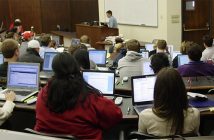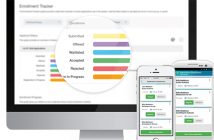
According to a recent study by the University of Cambridge, more leisure time spent in front of screens is correlated with a significant drop in GCSE scores.
14 year olds who spent an hour of leisure time in front of screens scored nine fewer points total on their GCSEs, which is equal to a drop of two grades letter grades (such as from a B to a D). Two hours resulted in 18 fewer points. TV viewing was found to be the most harmful to grades compared to other activities involving technology, like playing games or surfing the internet.
Cambridge’s Medical Research Council epidemiology unit conducted the study in an effort to see how sedentary lifestyles affected academic performance. They recorded the activity levels of 845 14-year-olds from Cambridgeshire and Suffolk, reports Sally Weale of the Guardian, and then compared that data with their GCSE results the following year. They used sensors to measure physical activity level and self-reported numbers for screen time. The average was about four hours per day, writes Dick Ahlstrom of the Irish Times.
The report’s author, Kirsten Corder of the Centre for Diet and Activity Research (Cedar), summarized the effects:
Spending more time in front of a screen appears to be linked to a poorer performance at GCSE. We only measured this behavior in year 10 [students 14 to 15], but this is likely to be a reliable snapshot of participants’ usual behavior, so we can reasonably suggest that screen time may be damaging to a teenager’s grades.
Further research is needed to confirm this effect conclusively, but parents who are concerned about their child’s GCSE grades might consider limiting his or her screen time.
Students also answered questions on how much time they spent doing homework and how often they read for pleasure. Students who did an extra hour of homework and reading scored an average of 23.1 more GCSE points, writes Kate Kelland of Reuters.
Physical activity, however, seemed to have no effect on the teenagers’ grades, according to Sarah Knapton of the Telegraph.
The authors of the study acknowledged that the rapid rate of change in technology since they began their study in 2005 may mean that their results are skewed.
Esther van Sluijs of Cedar said that parents and institutions should respond to the changing technology environment:
We believe that programs aimed at reducing screen time could have important benefits for teenagers’ exam grades as well as their health. It is also encouraging that our results show that greater physical activity does not negatively affect exam results. As physical activity has many other benefits, efforts to promote physical activity throughout the day should still be a public health priority.
The study was published in the International Journal of Behavioral Nutrition and Physical Activity.




